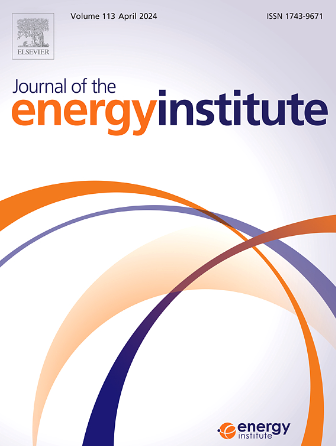热物理性质对微型催化燃烧室中甲烷/氧气混合物异相反应动力学的影响
IF 5.6
2区 工程技术
Q2 ENERGY & FUELS
引用次数: 0
摘要
本文对各种边界和壁面热物理条件下微催化燃烧室中的预混合甲烷/氧气异相反应特性进行了数值研究。使用 ANSYS Fluent 对三维模型进行了模拟,并与实验数据进行了验证,在使用纯异相反应时,最大差异仅为 1.92%。本研究旨在分析异相反应过程中影响化学和热反应的壁边界条件和热物理因素。结果表明,随着入口速度从 1 米/秒增加到 10 米/秒,反应产生的最大热量增加了 52.67%,通道和外壁的温度也相应增加。在入口速度为 2.5 米/秒的情况下,我们发现最大外壁温度均匀系数为 0.1911。此外,我们还观察到,随着异相反应的进行,铂的表面覆盖率和 H(s)位点覆盖率增加,但 O(s)、OH(s)、CO(s)和 C(s)位点覆盖率下降。此外,低对流传热和壁面热传导率提高了异质反应和甲烷转化的效率。由于壁面导热系数低,外壁温度均匀系数为 0.2863,甲烷转化率为 79.05%。研究结果表明,较高的热阻可将甲烷转化率从 68.18% 提高到 79.05%,并且微催化燃烧器内的燃烧过程是均匀和可控的,从而提高了其效率。这项研究的结果为优化微型燃烧器提供了有益的启示,为今后改进微型燃烧器的设计和运行效率铺平了道路。本文章由计算机程序翻译,如有差异,请以英文原文为准。
Effects of thermophysical properties on heterogeneous reaction dynamics of methane/oxygen mixtures in a micro catalytic combustion chamber
This paper presents a numerical investigation of premixed methane/oxygen heterogeneous reaction characteristics in a micro-catalytic combustion chamber under various boundary and wall thermophysical conditions. A 3-D model was simulated using ANSYS Fluent and validated against experimental data, with a maximum difference of only 1.92 % using a pure heterogeneous reaction. This study aims to analyze the wall boundary conditions and thermophysical factors that influence chemically and thermally during heterogeneous reactions. The results show that, with an increase in inlet velocity from 1 m/s to 10 m/s, the maximum heat produced by the reaction increases 52.67 % and the temperature of the channel as well as the outer wall increases accordingly. Using a 2.5 m/s inlet velocity, we found that the maximum external wall temperature uniformity coefficient was 0.1911. Furthermore, it was observed that as the heterogeneous reaction progresses, Platinum's surface coverage and the H(s) site coverage increase; however, the O(s), OH(s), CO(s), and C(s) site coverage decreases. Additionally, low convective heat transfer and wall thermal conductivity increase the efficiency of heterogeneous reactions and methane conversion. As a result of the low wall thermal conductivity, the outer wall temperature uniformity coefficient was 0.2863, while the methane conversion rate was 79.05 %. According to the results, higher thermal resistance increased the methane conversion rate from 68.18 % to 79.05 %, and the combustion process within the micro-catalytic combustor was uniform and controlled, thus enhancing its efficiency. The results of this study provide useful insights for optimizing micro-combustors, paving the way for future improvements in their design and operational efficiency.
求助全文
通过发布文献求助,成功后即可免费获取论文全文。
去求助
来源期刊

Journal of The Energy Institute
工程技术-能源与燃料
CiteScore
10.60
自引率
5.30%
发文量
166
审稿时长
16 days
期刊介绍:
The Journal of the Energy Institute provides peer reviewed coverage of original high quality research on energy, engineering and technology.The coverage is broad and the main areas of interest include:
Combustion engineering and associated technologies; process heating; power generation; engines and propulsion; emissions and environmental pollution control; clean coal technologies; carbon abatement technologies
Emissions and environmental pollution control; safety and hazards;
Clean coal technologies; carbon abatement technologies, including carbon capture and storage, CCS;
Petroleum engineering and fuel quality, including storage and transport
Alternative energy sources; biomass utilisation and biomass conversion technologies; energy from waste, incineration and recycling
Energy conversion, energy recovery and energy efficiency; space heating, fuel cells, heat pumps and cooling systems
Energy storage
The journal''s coverage reflects changes in energy technology that result from the transition to more efficient energy production and end use together with reduced carbon emission.
 求助内容:
求助内容: 应助结果提醒方式:
应助结果提醒方式:


